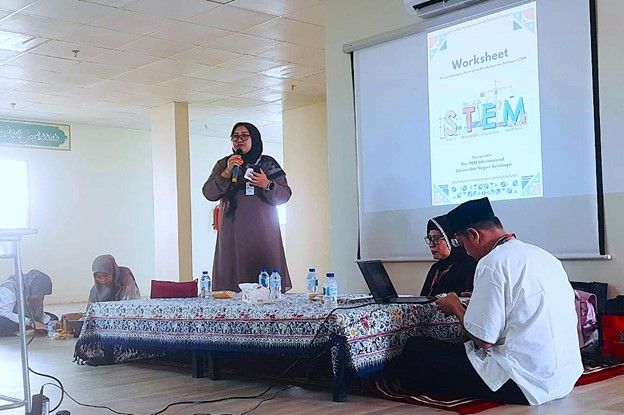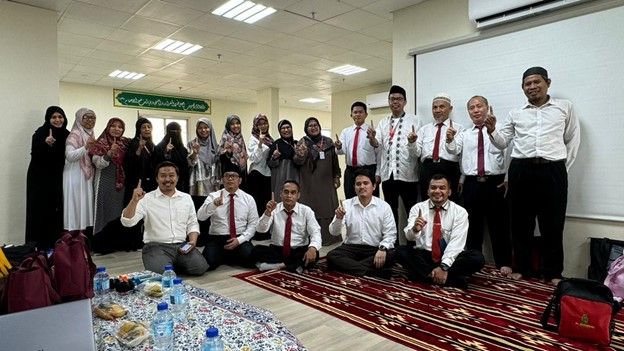
The PKM team delivered material about STEM learning to participants who were teachers at Makkah Indonesian School.
Unesa. AC ID. SURABAYA—In the midst of increasingly massive digital penetration and increasingly challenging dynamics in the world of education, teachers are required to be adaptive and continue to improve their competencies on an ongoing basis. Besides being able to be done by teachers independently, the role of a team of university experts is also needed.
On this basis, the community service team or international PKM, Faculty of Mathematics and Natural Sciences (FMIPA) Surabaya State University (UNESA) held STEM (Science, Technology, Engineering and Mathematics) learning training at the Makkah Indonesian School (SIM).
The training, which was chaired by the FMIPA professor, Rooselyna Ekawati, was attended by 25 SIM teachers at elementary, middle and high school levels who in Makkah and Riyadh. They come from the same subject group and teach more than one subject.
"From the aspect of learning needs and systems at SIM, teachers there need to use STEM-based learning that is easy to plan and implemented. That's why we provide this training," he said.
The PKM team, Sifak Indana, said that STEM learning has several superior characteristics that differentiate it from other learning approaches, including, integrated, student-centered, and Students are encouraged to ask questions, investigate and find answers independently.
Apart from that, this learning is also problem-based. In other words, students learn directly to solve problems in the world around them. Furthermore, this learning is contextual or related to students' daily lives.

The PKM FMIPA UNESA team together with the administrators and teachers of Makkah Indonesian School.
"Side "The interesting thing about STEM is that it involves experimental activities, designing and making prototypes, which can be applied when it comes to technology. And this learning encourages the development of students' 21st century skills," he explained.
Apart from delivering material, the PKM team also. providing guidance and ongoing training through PKM participant worksheets for teachers to easily develop STEM learning in the form of teaching modules.
As reinforcement, this training also includes discussion sessions on the application of STEM learning and the independent curriculum. The follow-up to this training in the future will also include discussions.
Rudianto Artiono, PKM team added that the spirit of the independent curriculum is to provide more relevant and meaningful learning. Apart from that, it is more flexible and focuses on developing students' competencies holistically.
The independent curriculum encourages learning to be more interactive and fun, and encourages the development of students' cutting-edge competencies such as communication, coordination, creativity and critical thinking.
At the final PKM session, the UNESA FMIPA and SIM teams agreed to establish further cooperation through the signing of an MoU between the two parties. This collaboration is related to the service agenda and other academic activities, such as the student mobility program for example.
SIM is happy to hold this training, and conveys its readiness to accept students sent by UNESA, either in the PLP or internship schemes there.[*]
***
Author: PKM FMIPA UNESA Team
Editor: @zam*
Photo: UNESA FMIPA PKM Team
Share It On:






